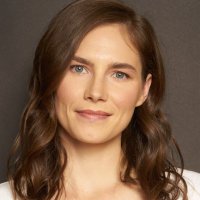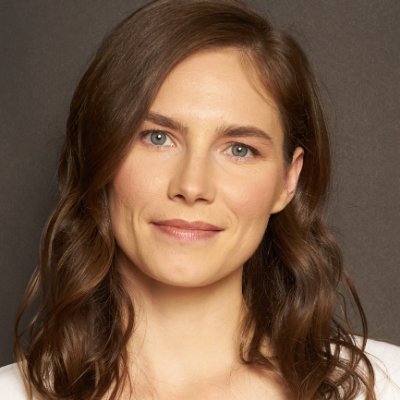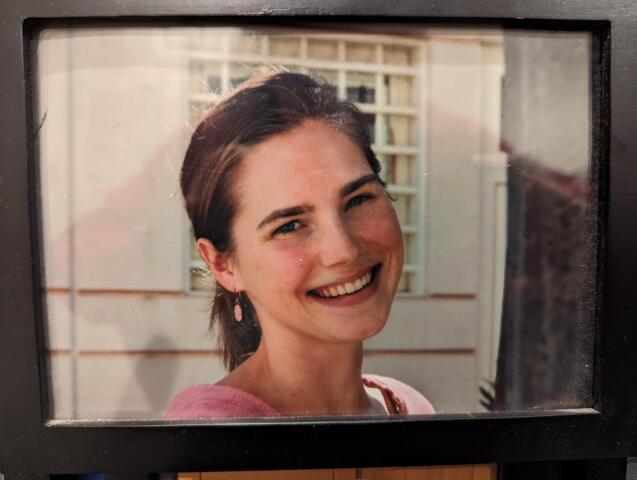
Amanda Knox@amandaknox
Feb 24, 2023
24 tweets
After I was convicted of murder and sentenced to 26 years in prison, when the earth dropped out from beneath me, and global shame rained down on top of me, I had my first ever epiphany.
/thread
I didn’t know what an epiphany should feel like, but it was…cold. Like a clear breeze blowing in and brushing the back of your neck, making your hairs stand up.
I knew something deep down that I hadn’t known before, and I spent the next several months peering into that epiphany, trying to consider all of its implications, like watching the ripples spread out from a drop of water in a pool.
My epiphany was this: I was not, as I had assumed for my first two years of trial and imprisonment, waiting to get my life back. I was not some lost tourist waiting to go home. I was a prisoner, and prison was my home.
I’d thought I was in limbo, awkwardly positioned between my life (the life I should have been living), and someone else’s life (the life of a murderer). I wasn’t. I never had been.
The conviction, the sentence, the prison cell—*this* was my life. There was no life I *should* have been living. There was only my life, this life, unfolding before me.
The epiphany itself didn’t feel good or bad. It was just true. If there was a feeling, it was the feeling of fact, and it came with the next logical conclusion: my life was sad.
I was imprisoned for a crime I didn’t commit. I would be locked away for the best years of my life, and deprived of opportunities many of us take for granted: falling in love, having children, pursuing a career.
My world would be so small, trapped within concrete walls and surrounded by traumatized people, many of whom were a danger to themselves and others.
And this life would inevitably take me further and further down a path that would alienate me from everyone I loved, who, despite their best efforts to be there for me, were on their own paths moving in very different directions.
The feeling of clarity, though, was in realizing that however small, cruel, sad, and unfair this life was, it was *my* life. Mine to make meaning out of, mine to live to the best of my ability. There was no more waiting. There was only now.
I was alone with my epiphany. I tried to explain it to my mom, but she couldn’t hear me. She thought I was depressed and giving up. She could not, and would not, accept that *this* was my life. She was going to save me, and she just needed me to survive until she did.
I told her I would, and it wasn’t a lie. I *would* survive. I knew that, deep in my bones. But I knew that precisely because I had finally accepted that I was living *my* life, whether I was eventually found innocent and freed, or not.
I allowed myself to begin to imagine alternate realities. What if I had been home that night, not Meredith, and Rudy Guede had killed me instead? What if I was acquitted and freed in five years? In ten?
What if I served my entire sentence, and came home in my late 40s, a barren, bereft woman? What if I killed myself…
I imagined all of those futures in vivid detail so that they no longer felt like shadows creeping over me from the realm of unconscious nightmares. And that allowed me to see my actual life for what it was, and to ask myself: How do I make *that* life worth living?
That was a big question, one I couldn't answer in its grandest sense. But there was a smaller version of that question: How can I make my life worth living *today?* I could answer that question, repeatedly.
That was entirely in my power. So I did that. Doing sit ups, walking laps, writing a letter, reading a book – these things were enough to make a day worth living. I didn’t know if they were enough to make a life worth living, but I remained open and curious to the possibility.
And while my new emotional default setting remained firmly stuck on sad—I woke up sad, spent the entire day sad, and went to sleep sad—it wasn’t a desperate, grasping sadness.
It was a sadness brimming with energy beneath the surface, because I was alive with myself and my sanity, and the freeing feeling of seeing reality clearly, however sad that reality was.
I was slowly and deliberately walking a tightrope across a bottomless foggy abyss, with no clue where I was going and nothing to hold onto but my strong, instinctual sense of balance.
In many ways, though I’m now free, legally vindicated, a woman with a career in the arts (as I’d always dreamed), an advocate for justice (which I never dreamed), a wife with a loving husband, a mother with a joyous child...I’m still walking that tightrope.
The abyss never leaves. It’s always there. And anyone who’s stared into it, as I have, knows the strange comfort of carrying it with you.
This is a picture of me in the prison yard in the thick of all of this. Everyone is going through something, even when they're smiling. If that sounds like you, I hope reading this helps.

Amanda Knox
@amandaknox
Exoneree, writer, co-host with @manunderbridge of LABYRINTHS podcast. Author of Waiting to Be Heard. Words in @TheAtlantic, @LATimes, @Independent, @TheFP.
Missing some tweets in this thread? Or failed to load images or videos? You can try to .
